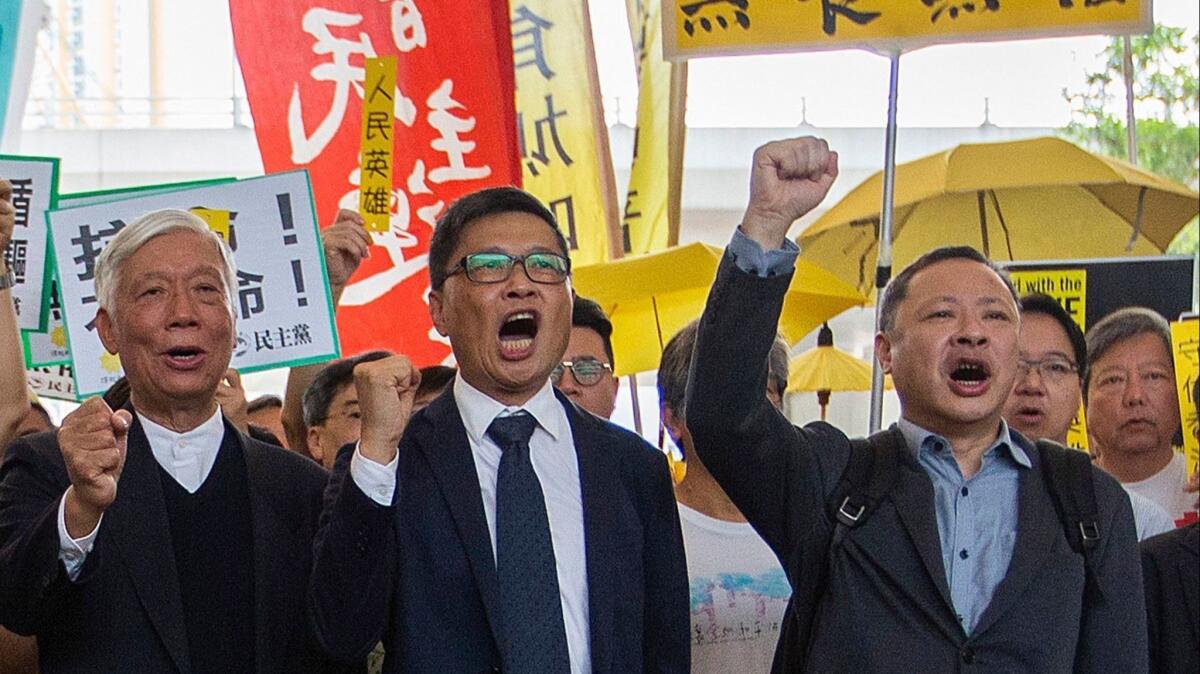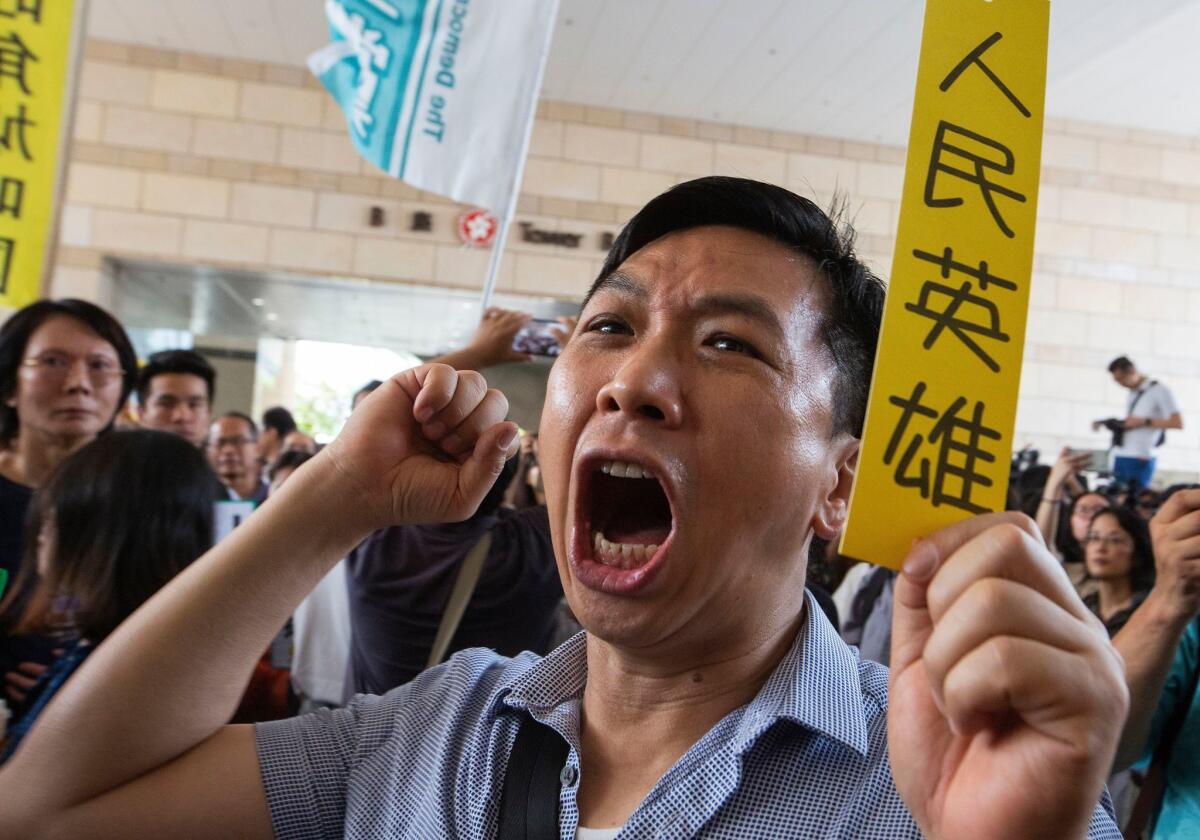With a Hong Kong court as his pulpit, pastor and convicted Occupy leader preaches democracy

Reporting from Hong Kong â In a Hong Kong court Tuesday afternoon, barristers in black robes and curly white wigs spoke for hours in British-accented English on legal precedence in cases of public nuisance.
Then the oldest man in the room stood up.
The Rev. Chu Yiu-ming, 75, white-haired in a dark suit, gave his final submission to the court in Cantonese, preaching from behind a glass barrier in the defendantsâ dock.
âToday, old and gray, I find myself in the defendantsâ dock, making a final plea as a convict. It looks so absurd,â Chu said. âYet my heart tells me that I have found the most honorable pulpit of my ministerial career.â
Chu and eight other leaders of Hong Kongâs pro-democracy Umbrella Movement of 2014 had just been convicted of various charges related to public nuisance.
They could face up to seven years in prison. Sentencing is scheduled for April 24.
Downstairs, a crowd of more than a hundred had gathered early in the morning, waving banners reading, âStand with the brave,â âProtect Hong Kongâ and âSelf-Sacrificial Love.â Some carried yellow umbrellas, reminiscent of those that protesters wielded against tear gas during the street demonstrations of 2014.
Outside the courtroom, hundreds of their supporters packed into the hallway and watched the televised session on two screens. As Chu spoke, many began to weep.
The minister recounted his life story: from surviving violent land reform campaigns in mainland China to orphaned homelessness in Hong Kong, then a conversion to Christianity that led to a lifetime of public service through a local Baptist church.
In Chai Wan, a low-income district where people lived in shanties and coffin-sized homes, Chu worked with drug addicts and gang members, advocated for public hospitals, and supported Chinese dissidents after the Tiananmen Square massacre â motivated by a faith that emphasized walking with the poor.
That same faith drives Chuâs belief in democracy.
âPolitical freedom is more than loyalty to the state,â he said. âIt professes human dignity.â
Chu was convicted Tuesday alongside fellow Occupy Central with Love and Peace leaders Chan Kin-man and Benny Tai. Student activists Tommy Cheung and Eason Chung, legislators Tanya Chan and Shiu Ka-chun, and political party leaders Raphael Wong and Lee Wing-tat were also convicted.

âItâs a slap in the face for the hundreds of thousands of people who went on the streets to protest peacefully for the government to fulfill its promises to bring democracy to Hong Kong,â said Maya Wang, China researcher for Human Rights Watch.
The court issued a judgment of more than 200 pages, saying the three Occupy leaders used âa wrong yardstickâ to measure the degree of disturbance their movement caused.
It said that âcivil disobedience is not a defense to a criminal chargeâ and called the tactics âunrealisticâ and ânaive.â
The judgment also denied that convicting the Umbrella leaders would cause a âchilling effectâ on the exercise of freedoms of speech and assembly.
âIn many cases, people really just want to express themselves and be quite constructive in how they think public affairs should be conducted,â said Wang. âBut the Chinese and Hong Kong government in the last five years generally react with a hammer.â
Hong Kong has never been a democracy. A special administrative region that was under British colonial rule until 1997, the region enjoys rule of law and fewer restrictions on freedoms of expression and assembly and use of the internet than does mainland China.
But Hong Kongâs legislature and chief executive are not elected directly. Half the legislature is composed of functional constituencies, and the chief executive is chosen by an electoral committee.
Hong Kong student leaders jailed over pro-democracy protest tied to Umbrella Movement Âť
When Hong Kong returned to China under the âOne Country, Two Systemsâ setup, China promised that Hong Kong would maintain autonomy except in military and foreign affairs, and that Basic Law, Hong Kongâs equivalent of a constitution, would remain unchanged for 50 years. Part of the law includes a provision for universal suffrage in electing Hong Kongâs chief executive.
In 2014, the Standing Committee of the National Peopleâs Congress in China proposed to alter the conditions of Hong Kongâs chief executive elections. Universal suffrage would be allowed â but only for two to three candidates nominated by a committee and deemed as people who âlove the country and love Hong Kong.â
Critics said this amounted to allowing everyone to vote, but only for Beijingâs choices.
In response, Hong Kongâs civil society came to its feet. Tai, a legal scholar whoâd begun campaigning for direct universal suffrage, invited Chu and Chan Kin-man, a sociology professor, to join him in a movement called Occupy Central with Love and Peace.
Chu was already 70 years old. Friends had encouraged him to stop his public work. âYouâve done enough,â they said, urging him to rest and focus on his health after a near-fatal bout with illness in 2008.
âBut I could not ignore the cry of conscience,â Chu said.
Fighting an âabyss of helplessnessâ -- life after Hong Kongâs âUmbrella Movementâ Âť
Tai originally envisioned Occupy Central as a two- or three-day sit-in. But as the movement started, another group of student protesters, led by then-17-year-old Joshua Wong, joined. The students boycotted class and stormed the government headquarters.
When police cracked down, hundreds of thousands more flooded the streets with the yellow umbrellas. Eventually, 1.2 million protesters participated, setting up camps in the financial centerâs busiest districts and paralyzing the city for 79 days.
As police responses escalated, images of Tiananmen flooded Chuâs mind. He knelt repeatedly with a cardinal and a barrister, praying for protection of the students and protesters. âMy heart kept telling me, âMust protect the students. Must keep the people from harm,â â he said.
The movement ended without violence, but also without meeting the protestersâ goals. Three of the student leaders were sentenced to prison, though Hong Kongâs highest court overturned their sentences last year.
A new wave of young candidates ran for office after the protests, but six of those who won were removed from the legislature for taking their oaths in what was deemed to be a disrespectful manner. Others have been disqualified by officials who question whether they believe that Hong Kong is an âinalienable partâ of China.
Meanwhile, several Hong Kong booksellers disappeared into Chinese detention.
This year, Hong Kongâs government proposed a new national anthem law, threatening up to three years of prison for anyone who insults the Chinese national anthem. In recent weeks, protests have erupted over a proposed extradition law that would allow China to extradite residents of Hong Kong to the mainland for trial.
Two years after âUmbrellaâ protests, Hong Kong prepares to vote on its future Âť
âNow we are talking one country, 1.5 systems â no more two systems,â Chan Kin-man said. As a sociologist, heâd spent more than 15 years developing grass-roots civil society in mainland China, especially with nongovernmental organizations that help AIDS victims and laborers. Hong Kong and China could develop civil society together, he once hoped.
The night before the verdict, Chan said he still believed in the movement, even as he knew people were âfrustrated, even exhausted.â
Recent public opinion polls from Hong Kong University show the lowest confidence in Hong Kongâs future since 1994.
The young are most disillusioned: 70% of those ages 18 to 29 had âno confidenceâ in Hong Kongâs future; 75% of the same age group had no confidence in âOne Country, Two Systemsâ; and 62% said they didnât trust Beijing.
âFor civil disobedience, the trial and even imprisonment itself are a very critical part,â Chan said. âThe government wants to create a chilling effect by prosecuting us. If we have good spirits, we can withstand this challenge and encourage other people.â
In a submission to the court in December 2018, Tai referenced the Rev. Martin Luther King Jr.âs âLetter From a Birmingham Jailâ in defense of Occupy Central.
âFollowing Dr. Kingâs steps closely in the path of civil disobedience, we strive to inspire self-sacrificing love and peacefulness but not to incite anger and hatred,â Tai wrote, noting that the protestersâ tactic was to sit on the street, arms locked, and wait for arrest without struggling.
âThis is a case about some Hong Kong People who love Hong Kong very much and believe that only through the introduction of genuine universal suffrage could a door be opened to resolving the deep-seated conflicts in Hong Kong,â Tai wrote.
At the end of his submission in court, Chu quoted King. He read a Bible verse, Micah 6:8, about justice, mercy and humility. He urged Hong Kong residents to have compassion for protesters and police officers alike, both âvictims of unjust systems.â
He spoke for all three leaders as he ended his speech: âWe have no regrets. We hold no grudges. No anger, no grievances. We do not give up.â
The crowds outside the courtroom stood and clapped as the defendants walked out.
More to Read
Sign up for Essential California
The most important California stories and recommendations in your inbox every morning.
You may occasionally receive promotional content from the Los Angeles Times.











